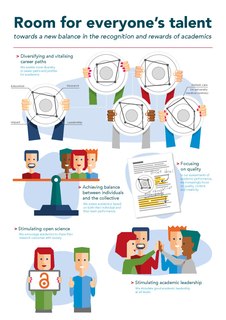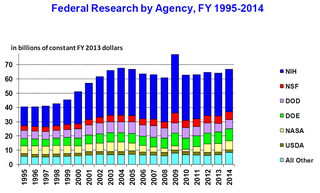Related Research Articles
The National Institute of Justice (NIJ) is the research, development and evaluation agency of the United States Department of Justice. NIJ, along with the Bureau of Justice Statistics (BJS), Bureau of Justice Assistance (BJA), Office of Juvenile Justice and Delinquency Prevention (OJJDP), Office for Victims of Crime (OVC), and other program offices, comprise the Office of Justice Programs (OJP) branch of the Department of Justice.

Science policy is concerned with the allocation of resources for the conduct of science towards the goal of best serving the public interest. Topics include the funding of science, the careers of scientists, and the translation of scientific discoveries into technological innovation to promote commercial product development, competitiveness, economic growth and economic development. Science policy focuses on knowledge production and role of knowledge networks, collaborations, and the complex distributions of expertise, equipment, and know-how. Understanding the processes and organizational context of generating novel and innovative science and engineering ideas is a core concern of science policy. Science policy topics include weapons development, health care and environmental monitoring.
Research funding is a term generally covering any funding for scientific research, in the areas of natural science, technology, and social science. Different methods can be used to disburse funding, but the term often connotes funding obtained through a competitive process, in which potential research projects are evaluated and only the most promising receive funding. It is often measured via Gross domestic expenditure on R&D (GERD).

The Directorate-General for Research and Innovation is a Directorate-General of the European Commission, located in Brussels, and responsible for the European Union's research and innovation policy and coordination of research and innovation activities. It is headed by Commissioner Mariya Gabriel and Director-General Jean-Eric Paquet.

The National Science Board (NSB) of the United States establishes the policies of the National Science Foundation (NSF) within the framework of applicable national policies set forth by the President and the Congress. The NSB also serves as an independent policy advisory body to the President and Congress on science and engineering research and education issues. The Board has a statutory obligation to "...render to the President and to the Congress reports on specific, individual policy matters related to science and engineering and education in science engineering, as Congress or the President determines the need for such reports,". All Board members are presidential appointees. NSF's director serves as an ex officio 25th member and is appointed by the President and confirmed by the US Senate.

Philip E. Rubin is an American cognitive scientist, technologist, and science administrator known for raising the visibility of behavioral and cognitive science, neuroscience, and ethical issues related to science, technology, and medicine, at a national level. His research career is noted for his theoretical contributions and pioneering technological developments, starting in the 1970s, related to speech synthesis and speech production, including articulatory synthesis and sinewave synthesis, and their use in studying complex temporal events, particularly understanding the biological bases of speech and language.

John Harmen "Jack" Marburger III was an American physicist who directed the Office of Science and Technology Policy in the administration of President George W. Bush, serving as the Science Advisor to the President. His tenure was marred by controversy regarding his defense of the administration against allegations from over two dozen Nobel Laureates, amongst others, that scientific evidence was being suppressed or ignored in policy decisions, including those relating to stem cell research and global warming. However, he has also been credited with keeping the political effects of the September 11 attacks from harming science research—by ensuring that tighter visa controls did not hinder the movement of those engaged in scientific research—and with increasing awareness of the relationship between science and government. He also served as the President of Stony Brook University from 1980 until 1994, and director of Brookhaven National Laboratory from 1998 until 2001.
The United States National Academy of Sciences' Board on Science, Technology, and Economic Policy (STEP) is a board of the United States National Academy of Sciences.

The Ministry of Science and Technology of the People's Republic of China, formerly the State Science and Technology Commission, is the central government ministry which coordinates science and technology activities in the country. The office is located in Xicheng District, Beijing. The ministry is responsible for formulating guidelines and related policies for science and technology in China development and promoting basic and special research on science and technology. The Ministry develop human resources, including introducing foreign intellectual planning and organising international scientific and technological cooperation and talent exchanges and strengthening China's innovation capabilities in the field of international scientific research.

Deborah L. Wince-Smith is the President of the United States Council on Competitiveness since 2001.
The Ministry of Science and Technology Urdu: وزارت سائنس و ٹیکنالوجی, wazarat-e- science o technology is a Cabinet-level Ministry of the Government of Pakistan concerned with Science and Technology in Pakistan and in general, Pakistan's science policy, planning, coordination and directing of efforts to initiate and launch scientific and technological programs as well as projects aimed at economic development.
The Science of Team Science (SciTS) is a field of scientific philosophy and methodology which advocates using cross-disciplinary collaboration from diverse scientific fields to solve complex present-day problems. The field encompasses both conceptual and methodological strategies aimed at understanding and enhancing the processes and outcomes of collaborative, team-based research. It is useful to distinguish between team science (TS) initiatives and the science of team science (SciTS) field. Team science initiatives are designed to promote collaborative, and often cross-disciplinary approaches to answering research questions about particular phenomena. The SciTS field, on the other hand, is concerned with understanding and managing circumstances that facilitate or hinder the effectiveness of collaborative science, and evaluating the outcomes of collaborative science. Its principal units of analysis are the research, training, and community-based translational initiatives implemented by both public and private sector organizations.

The Arctic policy of the United States is the foreign policy of the United States in regard to the Arctic region. In addition, the United States' domestic policy toward Alaska is part of its Arctic policy.

The science policy of the United States is the responsibility of many organizations throughout the federal government. Much of the large-scale policy is made through the legislative budget process of enacting the yearly federal budget, although there are other legislative issues that directly involve science, such as energy policy, climate change, and stem cell research. Further decisions are made by the various federal agencies which spend the funds allocated by Congress, either on in-house research or by granting funds to outside organizations and researchers.
Science diplomacy is the use of scientific collaborations among nations to address common problems and to build constructive international partnerships. Science diplomacy is a form of new diplomacy and has become an umbrella term to describe a number of formal or informal technical, research-based, academic or engineering exchanges, within the general field of international relations and the emerging field of global policy making.

The Networking and Information Technology Research and Development (NITRD) program consists of a group of U.S. federal agencies to research and develop information technology (IT) capabilities to empower Federal missions; support U.S. science, engineering, and technology leadership; and bolster U.S. economic competitiveness.
The Patient-Reported Outcomes Measurement Information System (PROMIS) provides clinicians and researchers access to reliable, valid, and flexible measures of health status that assess physical, mental, and social well–being from the patient perspective. PROMIS measures are standardized, allowing for assessment of many patient-reported outcome domains—including pain, fatigue, emotional distress, physical functioning and social role participation—based on common metrics that allow for comparisons across domains, across chronic diseases, and with the general population. Further, PROMIS tools allow for computer adaptive testing, efficiently achieving precise measurement of health status domains with few items. There are PROMIS measures for both adults and children. PROMIS was established in 2004 with funding from the National Institutes of Health (NIH) as one of the initiatives of the NIH Roadmap for Medical Research.
The Science and Technology Information Center (STIC) is an Ethiopian organisation which provides information to support scientific and technological (S&T) activities in the country. STIC has published information on the financing of research and development and on the nature and progress of innovative projects, and in 2014 was planning to introduce bibliometric monitoring of publications in S&T. The center has also provided information and communications technology facilities including a digital library, a patent information system, an automated personnel management system, and a S&T-related database.
NIH Office of Science Policy is the primary advisor to the Director of the NIH on matters of biomedical research policy issues that are of significance to the agency, the research community, and the public. The office also works with stakeholders within and outside of NIH to develop policies that promote progress in the life sciences. The current NIH Associate Director for Science Policy is Carrie D. Wolinetz, Ph.D.
Kaye Husbands Fealing is an American economist who is Dean of the Ivan Allen College of Liberal Arts at Georgia Tech. She previously taught for 20 years at Williams College, served in several staff positions with the National Science Foundation, and chaired the School of Public Policy at Georgia Tech. She is a former president of the National Economic Association.
References
- ↑ The Science of Science Policy: A Federal Research Roadmap. Report on the Science of Science Policy to the Subcommittee on Social, Behavioral and Economic Sciences, Committee on Science, National Science and Technology Council, Office of Science and Technology Policy (PDF) (Report). National Science and Technology Council. November 2008. DOE/SC-106. Archived (PDF) from the original on April 19, 2021.